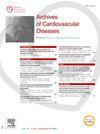应用蒙特利尔认知评估(MoCA)评估高血压患者认知功能障碍
IF 2.3
3区 医学
Q2 CARDIAC & CARDIOVASCULAR SYSTEMS
引用次数: 0
摘要
高血压患者的认知功能障碍日益受到关注。高血压,特别是在不受控制的情况下,对脑血管完整性有显著影响,导致不同程度的认知能力下降。目的探讨高血压患者的认知功能障碍。方法:我们进行了一项描述性、前瞻性、多中心研究,纳入了40岁以上、确诊为原发性高血压、既往未诊断为认知能力下降的患者。我们使用了阿拉伯语版本的蒙特利尔认知评估(MoCA),最高得分为30分,并有一个截止点<;作为认知障碍的标志。轻度认知障碍(MCI)的定义是得分在18到25之间,严重下降的定义是得分低于10。然后,我们将人群分为两组:认知能力下降组(由MoCA评分定义);26例,对照组无认知能力下降。结果纳入256例患者,平均年龄65±9岁,性别比0.77。高血压的中位病程为9.5年[5-15年]。48%的病例高血压得到控制(n = 122)。中位评分为18.8±6.5。192例(75%)患者发现整体认知功能受损,其中90例(46.8%)患有轻度认知损伤,25例(13%)严重下降。受影响最大的两个认知领域是注意力、概念思维和视觉构建能力。独立预测认知能力下降的五个因素分别是年龄较大(调整后的OR值:3.66 [95% CI: 1.23-10.93], P = 0.02)、女性(调整后的OR值:7.08 [95% CI: 2.07-24.18], P = 0.002)、久坐不动的生活方式(调整后的OR值:3.96 [95% CI: 1.03-15.12], P = 0.044)、血压控制不良(调整后的OR值:5.87 [95% CI: 1.61-21.38], P = 0.007)和左心室电性肥厚(调整后的OR值:5.09 [95% CI: 1.17-22.09], P = 0.30)。结论高血压患者认知障碍发生率较高。筛查和管理风险因素应该是一个优先事项,以便确定早期预防的最佳工具。本文章由计算机程序翻译,如有差异,请以英文原文为准。
Assessment of cognitive impairment in hypertensive patients using the Montreal cognitive assessment (MoCA)
Introduction
Cognitive impairment in hypertensive patients is a growing concern. Hypertension, particularly when uncontrolled, has a significant impact on cerebrovascular integrity, leading to various degrees of cognitive decline.
Objective
Our aim was to evaluate cognitive impairment in hypertensive patients.
Method
We conducted a descriptive, prospective, multicenter study including patients over 40-year-old age with confirmed essential hypertension without prior diagnosis of cognitive decline. We used the Arabic version of the Montreal Cognitive Assessment (MoCA) with a maximum score of 30 points and a cut-off < 26 as a marker of cognitive impairment. Mild cognitive impairment (MCI) was defined by a score between 18 and 25 and severe decline by a score below 10. We then divided our population into two groups: group with cognitive decline defined by MoCA score < 26 and group without cognitive decline.
Results
We included 256 patients with a mean age of 65 ± 9 years and a gender ratio of 0.77. The median duration of hypertension was 9.5 years [5–15 years]. Hypertension was controlled in 48% of cases (n = 122). The median score was 18.8 ± 6.5. Impaired global cognitive function was found in 192 patients (75%), 90 of whom (46.8%) had MCI and 25 (13%) had a severe decline. The two cognitive domains most affected were attention and conceptual thinking and visuoconstructive abilities. The five factors independently predictive of cognitive decline were older age (OR adjusted: 3.66 [95% CI: 1.23–10.93], P = 0.02), female gender (OR adjusted: 7.08 [95% CI: 2.07–24.18], P = 0.002), sedentary lifestyle (OR adjusted: 3.96 [95% CI: 1.03–15.12], P = 0.044), poor blood pressure control (OR adjusted: 5.87 [95% CI: 1.61–21.38], P = 0,007) and electrical left ventricular hypertrophy (OR adjusted: 5.09 [95% CI: 1.17–22.09], P = 0.30).
Conclusion
Our study showed that cognitive disorders were frequent in hypertensive patients. Screening and management of risk factors should be a priority in order to define the best tools for early prevention.
求助全文
通过发布文献求助,成功后即可免费获取论文全文。
去求助
来源期刊

Archives of Cardiovascular Diseases
医学-心血管系统
CiteScore
4.40
自引率
6.70%
发文量
87
审稿时长
34 days
期刊介绍:
The Journal publishes original peer-reviewed clinical and research articles, epidemiological studies, new methodological clinical approaches, review articles and editorials. Topics covered include coronary artery and valve diseases, interventional and pediatric cardiology, cardiovascular surgery, cardiomyopathy and heart failure, arrhythmias and stimulation, cardiovascular imaging, vascular medicine and hypertension, epidemiology and risk factors, and large multicenter studies. Archives of Cardiovascular Diseases also publishes abstracts of papers presented at the annual sessions of the Journées Européennes de la Société Française de Cardiologie and the guidelines edited by the French Society of Cardiology.
 求助内容:
求助内容: 应助结果提醒方式:
应助结果提醒方式:


